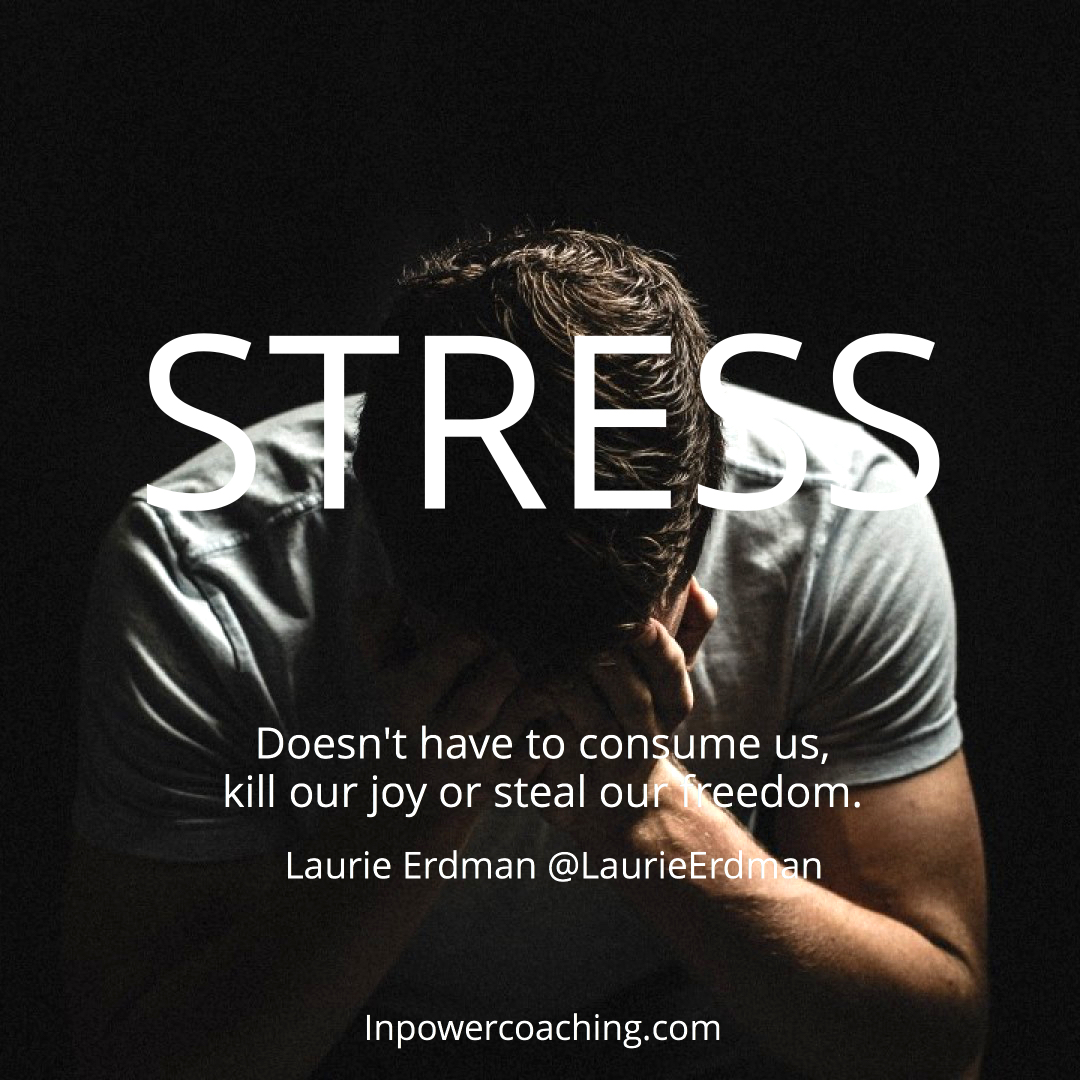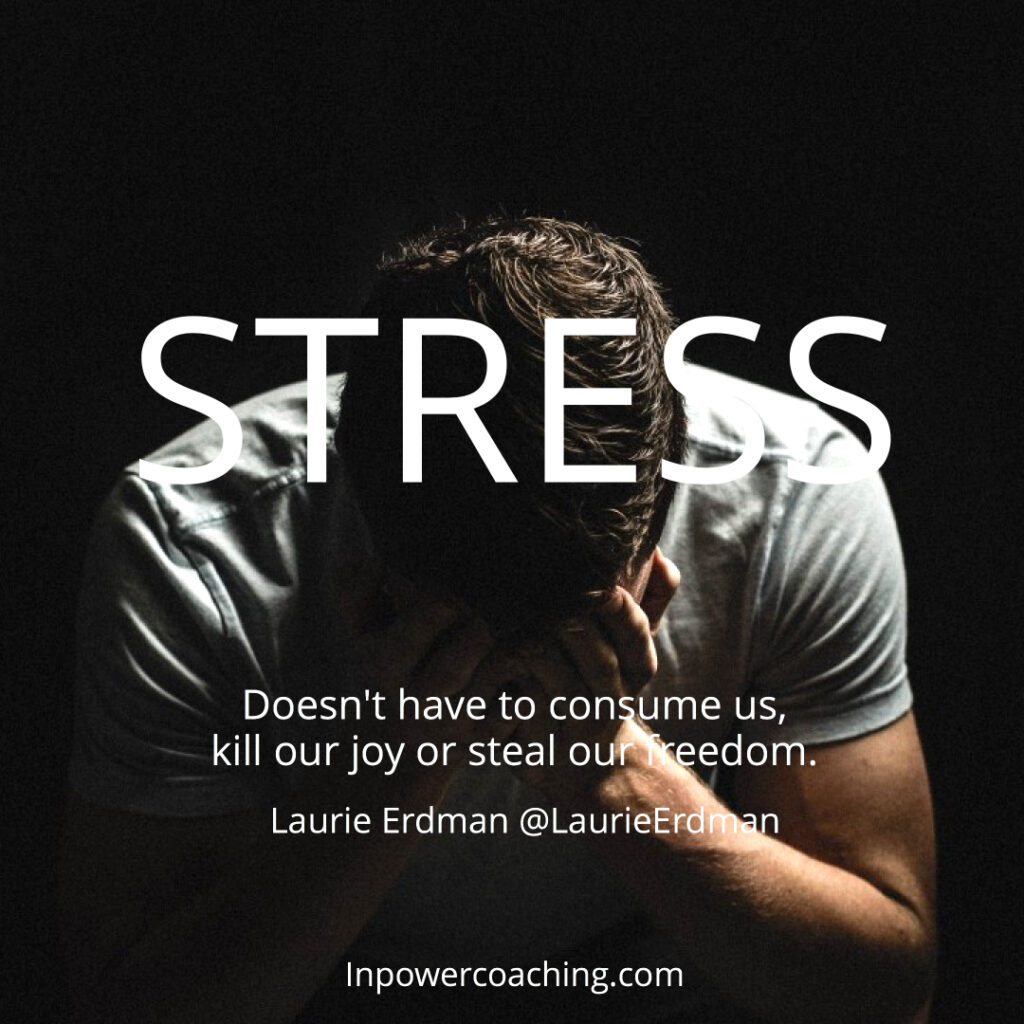April is Stress Awareness Month, so guess what we’ll be writing about a lot? Yes! How to manage stress! We’re kicking it off with Laurie Erdman, a true expert in the art of stress release, health and getting a lot done. – InPower Editors
Imagine if there were a disease affecting three out of four adults (and even more teenagers). It was costing the economy billions of dollars each year. The government would deem it an epidemic. Right?
There would be entire agencies dedicated to eradicating the disease. We would hold endless Congressional hearings. We would spend billions of dollars into finding a cure. Right?
Indeed, these reactions have all happened for diseases affecting far fewer Americans.
Three quarters of U.S. adults experience moderate to high daily stress. Our government and populous remain complacent.
The High Price Of Stress
This epidemic is silent because we accept stress as normal. Everyone is stressed? Stress just is. So we make little efforts to address this epidemic in our society or in ourselves, thinking there is nothing we can do.
The prices of our hamster wheel of stress are staggering.
- Stress costs “U.S. businesses an estimated $300 billion per year through absenteeism, diminished productivity, employee turnover and direct medical, legal and insurance fees.”1
- Stress is far more dangerous to our health than cigarette smoking or high cholesterol foods according to a 20-year study by the University of London.2
- Even believing stress is bad for us, can shorten our life span.3
This is only a sample of how bad stress is for us. Of course statistics don’t tell the whole story. We can’t measure the cost of lost dreams, happiness and vitality. We can’t measure the forgone joy and purposefulness we have traded in to get ahead or more tread water.
If the government can’t help us out of this epidemic, we must go to the source of our stress to recover our peace.
The Source Of Our Stress
According to the annual report of the American Psychological Association, we cite money and work as the number one causes of our stress. But stress is more complicated than the circumstances of our life.
Stress is a physical response resulting from a complicated dance between your hormones, neurons, beliefs and fears. In short, stress is an inside job starting at the cellular level. Stress takes more than a stress ball to relieve.
Stress about work and money start with our beliefs. You might hold the belief that if you speak your mind you will be overlooked for a promotion. You created this belief after your dad was passed over for a “sure thing” promotion and he got depressed. He swore it was because he had questioned his boss’ strategy.
Fast forward to present day. You’re in a meeting where the leadership has overlooked a key data in their new strategy. Should you speak up? Will you upset your boss if you do? She’s been cranky since the stock price has been falling. Performance reviews are only a few months away. You need that raise and a good bonus to make sure you can send your soon to private school next year. You angst over the decision to speak up or not for days. You lose sleep. You lose focus. Notice that none of the stress you’re experiencing has to do with anything anyone did to you. This is one small sample of how our beliefs about work, not work itself, cause our stress.
3 Strategies for How To Manage Stress
The fact that our beliefs about work and money are the source of our stress is freeing. We are in the driver’s seat of our own life experience. But how do we control our beliefs and the thoughts that flow from them to reduce our stress? Start with these three strategies for how to manage stress.
- Don’t react, respond. Stress is a physical response to a thought we have about an event. That event might be traffic, losing a job or a short deadline. The key to managing stress is not to manage the event, but to manage our response to the event. Indeed, its the only thing we can control. Too often we are on autopilot and react in a stressed out manner to a situation. Instead of reacting from stress, stop and look at the situation. Then choose how you want to respond to best solve the situation. Responding allows you to problem solve where reacting cranks up the stress meter.
- Take a deep breath. We breath shallowly when we’re stressed. Shallow breathing triggers the stress receptors that live in the upper lobes of our lungs. The good news is relaxation receptors live in the lower lobes of your lungs. By taking a few deep breathes, deep into our belly, we can stop our body’s physical stress response. This also tends to interrupt our runaway thoughts.
- Get perspective. Stress is our body’s fight or flight response to modern life. When our body senses danger it goes on heightened alert. Our blood pressure increases, breathing becomes shallow, and our pulse races. Instead, contemplate the worst case scenario. Ask yourself is that likely to happen? Is that realistic? What else is possible? You’ll soon realize your fears are highly unlikely to occur. You now have perspective on the situation and your stress melts away.
Stress about money and work don’t have to consume us. I invite you, as we enter Stress Awareness month, to experiment with these strategies. Do you experience more freedom, peace and happiness? Let us know in the comments below.
The article is adapted from Laurie’s upcoming book: Exiting The Hamster Wheel. You can download a preview at www.LaurieErdman.com
1 Don’t Let Workplace Stress Ruin Your Labor Day Holiday, American Psychological Association website, http://www.apa.org/helpcenter/labor-day.aspx
2 Cryer, B. (1996). Neutralizing Workplace Stress: The Physiology of Human Performance and Organizational Effectiveness. presented at: Psychological Disabilities in the Workplace, The Centre for Professional Learning, Toronto, CA. June 12, 1996
3 Rethinking stress: the role of mindsets in determining the stress response. Alia J Crum, Peter Salovey, and Shawn Achor, Journal of Personality and Social Psychology 104(4):716 (2013) PMID 23437923








